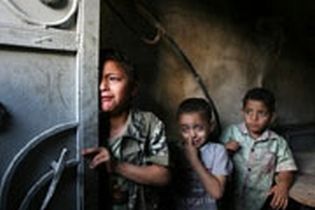I have heard it said in several different places that children below a certain age are either innocent of sin or are not held accountable for it. When I have asked for biblical justification for those statements, none has been forthcoming. One person said that the proof was the Jewish ceremony of bar mitzvah at the age of thirteen. Really? The best justification you can find is a Jewish ceremony, which is itself not biblical? Another person responded vaguely that a person cannot sin if he doesn't have the mental capacity to understand it as such. I will address how unbiblical that idea is in a moment.
We have a general statement in Scripture: "All have sinned and fall short of the glory of God" (Romans 3:23). Notice that word: "all." I readily admit that "all" is often used in Scripture where context shows that it means "all of a class," for example, or is otherwise restricted, not intending "all without exception." However, there is nothing in the context of Romans 3 to restrict its use here. Nor do the advocates of an age of accountability make any effort to show that it is restricted. Yet, they equivocate and treat it as restricted without providing an exegetical basis for that restriction: "all except those under twelve."
On the contrary, I insist that Paul means all mere humans, without restriction. I, however, will give you my exegetical basis for that assertion.
In Psalm 51:5, David, the man after God's own heart, writes, "Behold, I was brought forth in iniquity, and in sin did my mother conceive me." Far from any age of accountability, David laments the sin he had, not just as an infant, but from his conception. I don't see much wiggle-room there. Remember, this Psalm was written after David's murder of Uriah, adultery with the widow Bathsheba, and the death of their infant son. David's statement regarding sin had personal consequences for him.
A few pages over, look at Psalm 58:3: "The wicked are estranged from the womb; they go astray from birth, speaking lies." He is speaking of the reprobate here, that they are wicked in the womb, and go astray even as newborns. Again, there is no wiggle-room for sentimentalism here.
Lastly, consider the words of the Prophet Jeremiah. In Jeremiah 6:11, we find, "I am full of the wrath of the Lord; I am weary of holding it in. Pour it out upon the children in the streets, and upon the gatherings of young men also." And in 7:8, "The children gather wood, the fathers kindle fire, and the women knead
dough, to make cakes for the queen of heaven. And they pour out drink
offerings to other gods, to provoke me to anger." In both verses, God explicitly states that His wrath, and the judgment that arises from it, apply to the Israelite children. There is no allowance here for a belief that children aren't accountable for their sins and subject to the spiritual consequences.
I also have one sociological consideration that comes to my mind: if some people believe that children either have no sin, or are not under judgment for sin, then children who die would automatically go to heaven. If that is the case, then wouldn't a loving parent kill his children, to guarantee their eternal solicitude? Since the professors of this doctrine fail to do so, I can see only two logical consequences: either they hate their children, or (what I think is the true case), they do not believe their doctrine as strongly as they claim.
RE-IMAGINING THE MILLENNIUM (3)
1 day ago





No comments:
Post a Comment